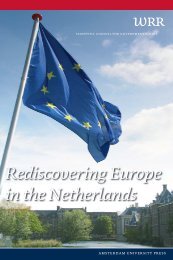The Western Condition - St Antony's College - University of Oxford
The Western Condition - St Antony's College - University of Oxford
The Western Condition - St Antony's College - University of Oxford
You also want an ePaper? Increase the reach of your titles
YUMPU automatically turns print PDFs into web optimized ePapers that Google loves.
An ambivalent decade: Three variations in the AKP’s foreign policy<br />
Every country it may be, but it is fair to say that contemporary Turkey has recently most<br />
spectacularly applied a full blown version <strong>of</strong> the doctrine to its foreign policy. For Davutoğlu, his<br />
country definitely benefits from a geographical and historical advantage on this count, but<br />
building on such potential was to involve balancing Turkey’s dependence on the West through<br />
the nurturing <strong>of</strong> multiple alternative alliances and in the process maintaining a Turkish-centric<br />
balance <strong>of</strong> power in its region. 64 This philosophy he summarised through the simple motto <strong>of</strong><br />
‘zero problems with neighbours.’<br />
During the second half <strong>of</strong> the decade, ‘zero problems’ first meant expanding existing zones <strong>of</strong><br />
influence and creating new ones by mediating conflicts (including those that involved Turkey) in<br />
such diverse disputes as between the Serbs and Muslims in Bosnia or between Pakistan and<br />
Afghanistan. In the Middle East, the AKP government sought to broker agreements between<br />
Syria and Israel, Hamas and Fatah (to the ire <strong>of</strong> the Mubarak regime) as well as between the US<br />
and Iran over the latter’s nuclear programme. In addition, Turkey hoped to acquire ‘strategic<br />
indispensability’ in the neighbourhood through an aggressive export-driven trade policy<br />
especially with Syria, Iraq, Iran and Russia, which in turn facilitated cooperation on security and<br />
energy issues with these countries. 65<br />
In sum, under Davutoğlu’s leadership, the Turkish foreign ministry entered into a period <strong>of</strong><br />
unprecedented activism and became an institution where state policy was made rather than<br />
merely received from the top brass and transmitted abroad. 66 In an astonishingly short time, this<br />
new approach led to Turkey’s emergence as an ambitious and pro-active medium power bent on<br />
increasing its geopolitical autonomy as a proactive respond to the growing multi-polarity <strong>of</strong> the<br />
post-Cold War order. And this new role seemed generally welcome as Turkey increasingly made<br />
itself strategically indispensable to a diverse group <strong>of</strong> actors, <strong>of</strong>ten with clashing interests.<br />
In Iraq, the Turkish government not only enjoyed cordial relations with the central government<br />
in Baghdad, but also increasingly with the autonomous Kurdish administration (Kurdistan<br />
Regional Government, KRG) in the north, despite the continued PKK presence and Turkish<br />
military operations in the mountainous border region, and differences over the legal status <strong>of</strong> the<br />
multi-ethnic oil-rich city <strong>of</strong> Kirkuk. President Gül’s 2009 visit to Baghdad was the first for a<br />
Turkish head <strong>of</strong> state in 33 years, and Prime Minister Erdoğan’s trip to Arbil, the seat <strong>of</strong> the<br />
ensure that a state can absorb a methodical <strong>of</strong>fensive and still be able to respond to and defeat an adversary.” Haider,<br />
2011.<br />
64 See Ahmet Davutoğlu, <strong>St</strong>rategic Depth: Turkey’s International Position (Istanbul: Küre Yayınları, 2000).<br />
65 See ‘<strong>St</strong>rategic Plan 2010 – 2014’, Republic <strong>of</strong> Turkey Ministry <strong>of</strong> Energy and Natural Resources,<br />
http://www.enerji.gov.tr/yayinlar_raporlar_EN/ETKB_2010_2014_<strong>St</strong>ratejik_Plani_EN.pdf<br />
66 <strong>The</strong> typical image from this period is that <strong>of</strong> a large delegation <strong>of</strong> ministry bureaucrats and advisors accompanied<br />
by dozens, sometimes hundreds <strong>of</strong> businesspeople arriving in an African or Latin American city to inaugurate a new<br />
consulate, establish direct flights to Istanbul via Turkish Airlines and sign numerous trade and energy cooperation<br />
agreements.<br />
32

















